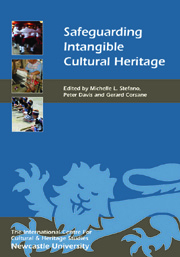Book contents
- Frontmatter
- Contents
- List of Illustrations
- Acknowledgments
- Touching the Intangible: An Introduction
- NEGOTIATING AND VALUING THE INTANGIBLE
- 1 The Paradoxes of Intangible Heritage
- 2 Memory, Museums and the Making of Meaning: A Caribbean Perspective
- 3 From Intangible Expression to Digital Cultural Heritage
- 4 Conversation Piece: Intangible Cultural Heritage in Sweden
- 5 Africa's Rich Intangible Heritage: Managing a Continent's Diverse Resources
- 6 The Silence of Meanings in Conventional Approaches to Cultural Heritage in Jordan: The Exclusion of Contexts and the Marginalisation of the Intangible
- 7 Conversation Piece: Intangible Cultural Heritage in India
- APPLYING THE INTANGIBLE CULTURAL HERITAGE CONCEPT
- ON THE GROUND: SAFEGUARDING THE INTANGIBLE
- List of Contributors
- Index
6 - The Silence of Meanings in Conventional Approaches to Cultural Heritage in Jordan: The Exclusion of Contexts and the Marginalisation of the Intangible
from NEGOTIATING AND VALUING THE INTANGIBLE
Published online by Cambridge University Press: 05 February 2013
- Frontmatter
- Contents
- List of Illustrations
- Acknowledgments
- Touching the Intangible: An Introduction
- NEGOTIATING AND VALUING THE INTANGIBLE
- 1 The Paradoxes of Intangible Heritage
- 2 Memory, Museums and the Making of Meaning: A Caribbean Perspective
- 3 From Intangible Expression to Digital Cultural Heritage
- 4 Conversation Piece: Intangible Cultural Heritage in Sweden
- 5 Africa's Rich Intangible Heritage: Managing a Continent's Diverse Resources
- 6 The Silence of Meanings in Conventional Approaches to Cultural Heritage in Jordan: The Exclusion of Contexts and the Marginalisation of the Intangible
- 7 Conversation Piece: Intangible Cultural Heritage in India
- APPLYING THE INTANGIBLE CULTURAL HERITAGE CONCEPT
- ON THE GROUND: SAFEGUARDING THE INTANGIBLE
- List of Contributors
- Index
Summary
It is through understanding the meaning and nature of what people tell each other about their past; about what they forget, remember, memorialise and/or fake, that heritage studies can engage with academic debates beyond the confines of present-centred cultural, leisure or tourism studies.
(Harvey 2001, 320)INTRODUCTION
This chapter identifies the intangible as being memories and stories involved in the meaning-making process of archaeological sites that are generally referred to as cultural heritage. These memories and stories are shaped and reshaped by local communities' perceptions of, and experiences in, archaeological sites. They are also governed by contemporary contexts and cultures rather than intrinsic values that scholars assign to cultural heritage. In this sense, memories and stories anchor archaeological sites to the present and thereby transform them into cultural heritage. Thus, it is the intangible that makes the tangible material of the past meaningful for people.
This chapter weighs the anthropological approach to cultural heritage against conventional approaches. While conventional approaches are based on passive evaluation and ‘scientific’ intervention, the anthropological approach explores people's memories, stories, experiences and sense of place in order to define, evaluate and approach cultural heritage. Conventional approaches were recognised in the early ICOMOS conventions (ie Athens and Venice Charters) and were part of the colonial legacy in post-colonial contexts such as Jordan. While post-colonial contexts are embracing conventional approaches in their top-down management of cultural heritage, Western contexts are increasingly recognising the anthropological approach as a dynamic approach to the past and its material.
- Type
- Chapter
- Information
- Safeguarding Intangible Cultural Heritage , pp. 71 - 84Publisher: Boydell & BrewerPrint publication year: 2012



